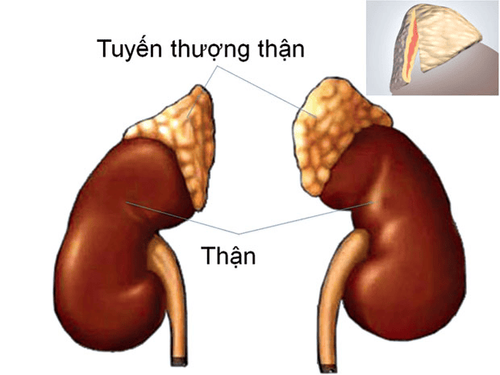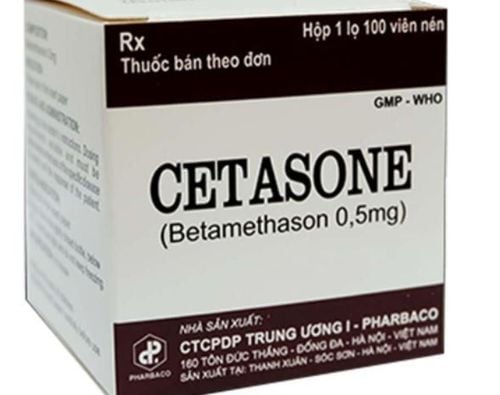This is an automatically translated article.
Adrenal insufficiency is a serious condition that occurs when the body is not able to produce enough cortisol. People with Addison's disease or with adrenal gland damage may not produce enough cortisol. The synacthen test is used to assess adrenal function.
1. Definition of Synacthen test
The Synacthen test is defined as the use of a special chemical to test the function of the adrenal glands to make the hormone cortisol. The synacthen test involves stimulating the adrenal glands and then checking to see if the adrenal glands are capable of responding. Synacthen, also known as tetracosactide, is a chemical used in the synacthen test.
The synacthen test is used to check the function of the adrenal glands. This test provides information about how well the hypothalamus, pituitary, and adrenal glands are working together. The synacthen test is also used to diagnose Addison's disease.
2. What is the adrenal gland?
About the anatomical position, the adrenal gland is located deep behind the peritoneum, which is an endocrine gland that plays an important role in the body's vital activities. There are two adrenal glands located above each kidney. About the size of a walnut, each adrenal gland has an outer part (adrenal cortex) and an inner part (adrenal medulla). Cells in different areas of the adrenal gland make different hormones. The adrenal glands secrete the hormones cortisol, aldosterone, and androgens. These hormones participate in complex metabolic processes, especially the catecholamines of the adrenal medulla, which regulate arterial blood pressure. The increased secretion of hormones caused by adrenal tumors is the cause of many dangerous pathological syndromes that are difficult to treat thoroughly with medical therapy.
Cortisol is a steroid hormone that plays an important role in the body. Functions of the adrenal glands include:
Supports blood pressure regulation. Helps the body regulate the immune system. Supports the body's response to stress. Helps balance insulin levels in blood sugar regulation.

Tuyến thượng thận
3. Definition of adrenal insufficiency
What is adrenal insufficiency? This is a disorder that occurs when the adrenal glands are not working properly, causing the hormone cortisol to produce too little, sometimes even aldosterone, leading to a disorder in the body's metabolism, salt and water metabolism. body will be excreted outside through urine, this will cause blood pressure to drop very low. At the same time, the amount of potassium will increase rapidly to dangerous levels, very seriously affecting human health. Adrenal insufficiency is a condition that can occur at any age.
One of the causes of acute adrenal insufficiency is due to improper use of glucocorticoid drugs. If you take too much glucocorticoid, it will suppress the adrenal gland's activities and when you stop taking this medicine, the adrenal gland will lose its ability to return to normal, leading to adrenal insufficiency. The risk of adrenal insufficiency increases when you are simultaneously experiencing strong mental or physical stress (trauma, surgery, etc.), which will be very life-threatening.

Suy tuyến thượng thận cần được điều trị sớm
4. How is the Synacthen test performed?
During the synacthen test, you are given an injection of a chemical called tetracosactide. If cortisol levels remain low despite tetracosactide injection; This indicates a problem with adrenal gland function. Usually, the Synacthen maneuver will be done in the hospital in the morning.
First, the medical staff will draw blood to check your cortisol levels to start the synacthen test. Your doctor will set up an intravenous line so you can draw blood and give tetracosactide at the same time. Your healthcare provider will inject tetracosactide into your vein or into your arm. In a test called the “short synacthen test,” the blood sample will be drawn again about 30 minutes and 60 minutes after you receive the tetracosactide injection. If you get the “Short-acting synacthenic test,” you will be done soon. Alternately, you might be given the “long synacthen test”. This is the type of test where you get a blood test before the test begins. You are then given an injection of tetracosactide and the blood sample is checked at regular intervals over a 24-hour period.

Nghiệm pháp Synacthen
Normal results Rapid test: cortisol level increased more than 7 mcg/dL above baseline.
24-hour test: cortisol level higher than 40 mcg/dL.
3 day test: cortisol level higher than 40 mcg/dL.
Abnormal results For adrenal insufficiency:
Cortisol levels rise above normal (secondary adrenal insufficiency):
Hypopituitarism ; Endogenous steroid production from non-endocrine tumors. Normal or below-normal cortisol levels (primary adrenal insufficiency):
Addison's disease; Adrenal infarction/hemorrhage; Tumor metastasis to the adrenal gland; Congenital adrenal insufficiency enzymes; Surgical removal of the adrenal gland. As for the side effects of the synacthen test, there are usually no side effects, except there may be a small bruise where the needle was inserted. In some cases, there may be swelling in the vein where the blood was drawn, but it usually returns to normal within a few days.
Vinmec International General Hospital is one of the hospitals that not only ensures professional quality with a team of leading medical doctors, modern equipment and technology, but also stands out for its examination and consultation services. comprehensive and professional medical consultation and treatment; civilized, polite, safe and sterile medical examination and treatment space. Customers when choosing to perform tests here can be completely assured of the accuracy of test results.
Customers can directly go to Vinmec Health system nationwide to visit or contact the hotline here for support.
MORE:
Causes and symptoms of chronic adrenal insufficiency Signs and symptoms of adrenal cancer Causes of benign adrenal tumor formation













